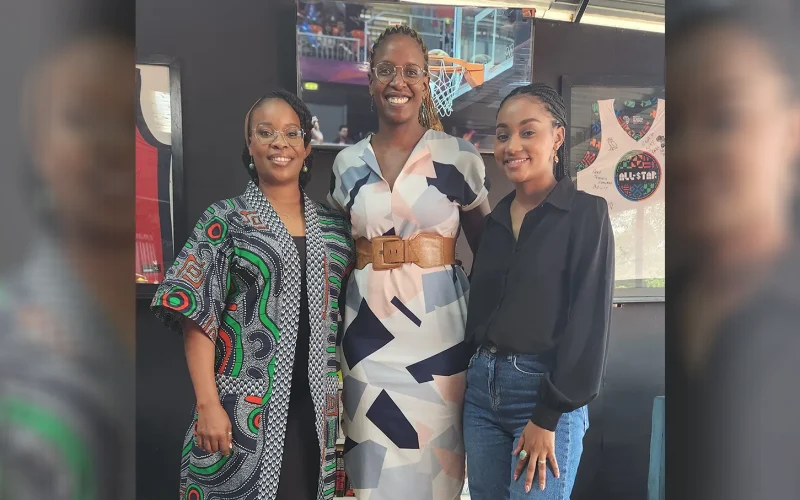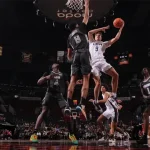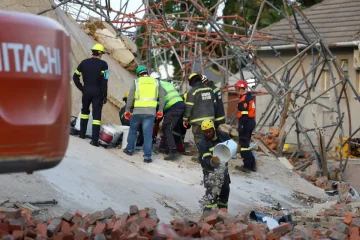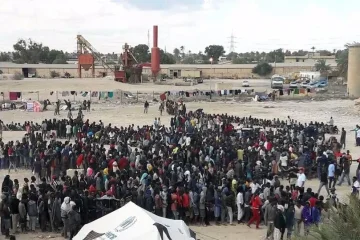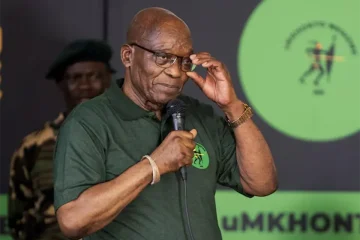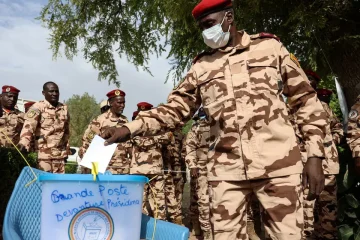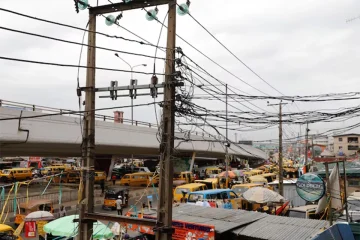AS African basketball presenter and correspondent Silaei Shani found out, Jumping for Change is far more than a basketball film. Against the backdrop of Kenya’s Maasai community, it delivers a strong message about societal norms and embracing change, while staying true to one’s heritage. A winner at the esteemed Films for Fans NBA Awards, it explores the transformative power of sport within the rich tapestry of African culture.
Silalei Shani interviewed the film’s producers, Becky Muikia and Rahma Saif, for bird story agency, in Nairobi. The interview has been edited for length.
SS: So, we’re here to talk about your film Jumping for Change. What was the inspiration and genesis behind the project? Why did you decide to do this story?
BM: So, when we pitched for the show the one thing that I was very clear on was that it needed to be a hyper-local story in that it was the kind of story that could be shot anywhere in the world but was authentically a Kenyan story. We had a big think tank going around what kind of story we wanted to tell, and my reference was an article I found online. There’s this Maasai team that plays cricket and they wear their full Maasai regalia when they’re playing cricket.
That was my reference and I sent it to Rahma.
RS: So, the Maasai cricket team also has a sister Maasai basketball team. The female team is called the Laikipia Basketball Ladies, and they play basketball as a tool to help them combat harmful practices within their community such as FGM (Female Genital Mutilation). They very quickly became the inspiration for this story. Our focus was not on the FGM per se but on this beautiful story of how culture and progress can coexist within the same community. It became very clear to us that we needed to tell this story and we needed to share it with the world.
SS: Right. So, something that I thought was very cool was how there was not a lot of dialogue in the film. It was very visual, minus the narration, and I wanted to know if that was intentional.
RS: It was super intentional. That was something that kept on coming up within our brainstorming sessions when we were storyboarding and when the script was being written. What we wanted to do with this film was create a film that is extremely inspirational, but also transcends the language barrier.
Wherever in the world that you may be, when you come across this film and you watch it, you’re able to understand and get the message.
I’m actually really happy we went in that direction because it doesn’t matter where you’re from or if you watch the film and it doesn’t have subtitles or if you don’t hear the voiceover, you’re still able to understand what’s happening within the story and then you’re able to emotionally connect with the story and with the characters.
SS: Along those lines, there were a lot of messages that were kind of implied. I noticed in the part where the people were watching the basketball game that there were older women present. What kind of message were you trying to send by not just having the older women there but seeing them be supportive of these younger girls playing basketball.
RS: With this, what we’re trying to portray was a wider cultural shift towards gender inclusivity and women empowerment. If you look at our traditional African context, a lot of activities, even our own sports are male dominated. So, for us, it was to show that there’s a shift in thinking within the community. That seeing these women engaging with the game, enjoying the game, is bringing them into the fold. While they are there, they’re also just as engaged and enjoying the game as much as the women are. Nothing is a myth there. For us it was about portraying gender inclusivity and the empowerment of the African woman through the universal language of sport.
BM: And if I could just piggyback on what Rahma has said, we’re very communal as a country, as a continent and it was important for that message to come out very strongly visually. The community was there to endorse what was happening. The game in itself is an anomaly: how it is that it starts, the ladies walking away, the guys challenging them. Even how the old people were gathered by a young girl. Ideally, you would expect that they would shoo her off and be about their business, but that they paid attention and actually came and stuck around until the end of the game, it was an ode to how we support each other as Kenyans- how we rally behind each other when we need to in good and in bad times.
SS: Very nice. And talking about the young girl, you ended with a very nice closing shot, wide angle, where the excitement has died down and everyone has gone away and then it’s just her playing basketball alone. What was the symbolism behind that closing shot?
RS: I think what that shot speaks to for me is the need for continuity and for hope in the younger generation. That despite their age, gender, where they come, they can pursue their dreams fearlessly and unapologetically. This girl experienced this magical thing that she might have never seen in a different time. This has given her the courage to pursue her dreams and that was the key message for us. This next generation is going to be able to achieve whatever they set their minds to.
I also think there is a powerful testament there about the lasting impact of including positive influences can have in a traditional setting. Including influences such as sport can pave the way for such amazing change for the future generations.
SS: Another scene that stood out to me was when the girls were playing and the young morans come in. They didn’t even kick off the girls, the girls voluntarily starting walking off the court then it was the men who told them to stay. Are men the gatekeepers towards breaking certain cultural stereotypes and cultural ceilings for women?
BM: I wouldn’t call them gatekeepers but they definitely need to be allies. In this particular aspect, the men were the greatest allies because the women eliminated themselves from the game. Culturally speaking, the ladies should have been fetching water, cooking, taking care of the household and doing chores relegated to their gender. Basketball was not on that list.
Ideally, you would imagine the boys own the court so seeing them there was like “Okay, I guess we have no business being here”. But the men welcomed them and challenging them to the game was acknowledging that we can be equals but fight for this opportunity to actually play on this court.
SS: I actually really liked that angle. I’m a basketball player and something myself and my friends say when we’re playing against guys is do not come down to our level. You play at your level, and we’re going to play at our level. The film showed that the guys didn’t play soft on the girls. They were dunking, they were shoving them, it was very aggressive. I like that even still within that context, the girls scored.
BM: And we just needed the one shot.
RS: It definitely emphasizes that they see them as peers and they actually believe that their skill level is at par. So I don’t think the men are the gatekeepers but it’s a communal initiative, that we all have to be involved in breaking these stereotypes.
SS: Like I said, I actually play basketball and I thought it was really cool that some of the cast are actually people I’ve played against and coached with. How important was it for you when you were doing the casting to be authentic in that way where you’re using actual female basketball players in the league to be part of the team.
RS: Like you said, that was an intentional choice for the purposes of authenticity and inspiration. So these women are skilled basketball players and are actually playing the game and shaping their futures using sports as the avenue. It sends the message of empowering young women, African women, and gender inclusivity just because we’re highlighting real-life players who are doing this thing and achieving their dream.
BM: And from a creative enterprise perspective it’s important also to grow the value chain. To show sports people that you do have a place in this world. We could have hired actresses and spent months or weeks grooming and training them and giving them the skill set, but it’s important for sports people, actually, the entire ecosystem, that the value chain can grow if we collaborate. So that was a great marriage between the production side of it and the sports part of it. I think it was also exciting for them to be on screen as actors and actresses.
SS: Absolutely. In the sports space, we’re trying to teach that athletes don’t have to just play the sport, it can open up other avenues in business and in the arts. I have one last question, the title, how did you come up with Jumping for Change?
RS: I think that came from the script. When you listen to the narrator, the first line is “Something happens when you look up”. So what do you see when you look up? You see people taking a leap, daring to make a change. So there’s the underlying narrative for jumping or hooping but also when you think of this girl looking up and seeing these amazing basketball players jumping up and taking those shots, creating an impact within their communities, it almost just presented itself on a platter for us. She’s looking up and seeing these women jumping for change, it stuck in the writing room.
BM: If you can’t already tell, this was our voiceover artist.
SS: I actually could not tell! But now that you’re talking I hear it. This project was really dear to you in particular then.
RS: I was definitely immersed in the entire process, coming up with the idea, I was in the writing room, I was in the community…so it is very dear to my heart and more than that it was the impact that we saw in the community and the curiosity that it picked. We left the court, hoops and balls in the community and when we were leaving we saw them playing and taking shots and trying to understand the game. That was amazing. There was a lasting impact that we left there.
SS: Perfect. I think that’s a good place to wrap up. Thank you so much, ladies.
BM&RS: Thank you for having us.
Becky Muikia, BM, is the Executive Producer, MD, and Creative Director at the communications agency Sahihi Africa.
Rahma Saif, RS, is head of projects and lead producer at Sahihi Africa.
With Sahihi’s focus on Pan-African storytelling, both are passionate about African narratives being told by Africans.

